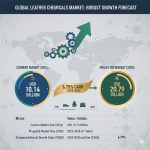Artificial Intelligence in Genomics: Transforming the Future of Healthcare
Key Takeaways
- The global AI in genomics market is projected to skyrocket from USD 785.12 million in 2024 to USD 28,999 million by 2035, at a CAGR of 43.2%.
- AI technologies, especially machine learning and deep learning, are revolutionizing genomics by enabling rapid, accurate analysis of massive genetic datasets.
- Drug discovery, precision medicine, and diagnostics are the leading application areas driving market growth.
- North America currently dominates the market, but Asia Pacific is emerging as the fastest-growing region.
- Major players are leveraging collaborations, partnerships, and innovative product launches to gain a competitive edge.
- The future outlook is robust, with significant opportunities and challenges, including regulatory considerations and investment trends.
Overview of the AI in Genomics Market
The integration of Artificial Intelligence (AI) into Genomics is reshaping the landscape of healthcare and life sciences. As sequencing technologies generate ever-larger volumes of genetic data, the need for advanced analytical tools has become paramount. AI, with its ability to process and interpret complex datasets, is meeting this need head-on. According to Vantage Market Research, the global AI in genomics market is valued at USD 785.12 million in 2024 and is expected to reach an astonishing USD 28,999 million by 2035, reflecting a compound annual growth rate (CAGR) of 43.2%. This explosive growth is driven by several key factors.
First, the increasing adoption of next-generation sequencing (NGS) technologies has led to a surge in genomic data, necessitating more sophisticated analysis tools. AI algorithms, particularly those based on machine learning (ML) and deep learning (DL), are uniquely suited to uncover patterns and insights from these vast datasets. Second, the push toward personalized medicine is fueling demand for AI-driven solutions that can tailor treatments to individual genetic profiles. Third, the pharmaceutical industry is leveraging AI to accelerate drug discovery and development, reducing time-to-market and costs.
Get a Sample Copy:- https://www.vantagemarketresearch.com/artificial-intelligence-in-genomics-market-2252/request-sample
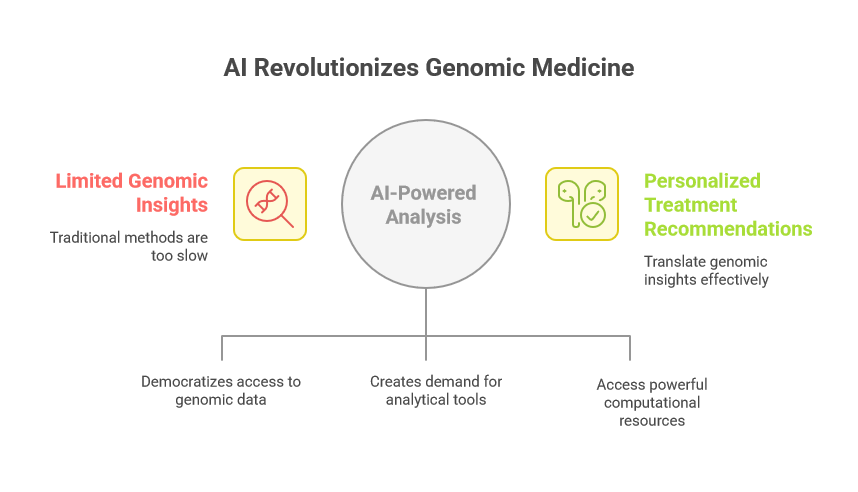
However, the market is not without its challenges. Data privacy and security concerns, especially regarding sensitive genetic information, remain significant barriers. Additionally, the high cost of implementing AI solutions and the need for skilled professionals can limit adoption, particularly in resource-constrained settings. Despite these hurdles, the overall outlook for AI in genomics is overwhelmingly positive, with ongoing technological advancements and supportive regulatory frameworks expected to drive continued growth.
Technological Advancements in AI for Genomics
The technological landscape of AI in genomics is evolving at a rapid pace. Machine learning, a subset of AI, plays a pivotal role in analyzing genomic data. ML algorithms can identify genetic variants associated with diseases, predict patient outcomes, and even suggest potential therapeutic targets. Deep learning, which mimics the human brain’s neural networks, has further enhanced the ability to interpret complex genomic information, enabling breakthroughs in areas such as variant calling, gene expression analysis, and epigenomics.
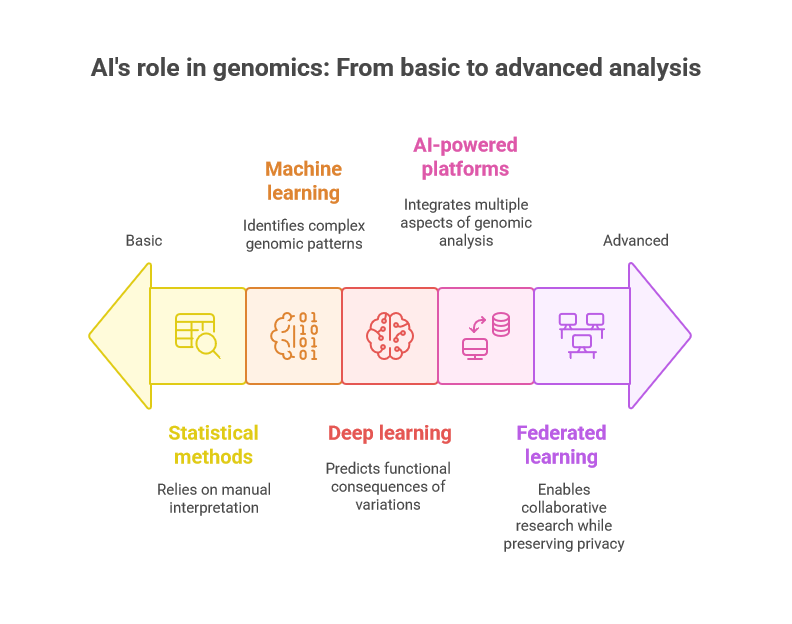
AI-powered software solutions are at the forefront of this revolution. These platforms can automate the annotation of genetic variants, prioritize clinically relevant mutations, and integrate multi-omics data for a holistic view of patient health. Companies are developing user-friendly interfaces that allow researchers and clinicians to harness the power of AI without requiring advanced computational expertise.
Integration with genome sequencing technologies is another critical advancement. AI algorithms are now embedded within sequencing platforms, enabling real-time analysis and interpretation of data as it is generated. This seamless integration accelerates the diagnostic process and supports rapid decision-making in clinical settings. Moreover, cloud-based AI solutions are making it easier to store, share, and analyze genomic data at scale, fostering collaboration across institutions and geographies.
The convergence of AI with other emerging technologies, such as blockchain for secure data sharing and the Internet of Things (IoT) for real-time monitoring, is further expanding the possibilities in genomics. As these technologies mature, they are expected to unlock new applications and drive even greater value for researchers, clinicians, and patients alike.
Market Segmentation: AI for Genomics by Application
The applications of AI in genomics are diverse, but three areas stand out as primary drivers of market growth: drug discovery and development, precision medicine, and diagnostics.
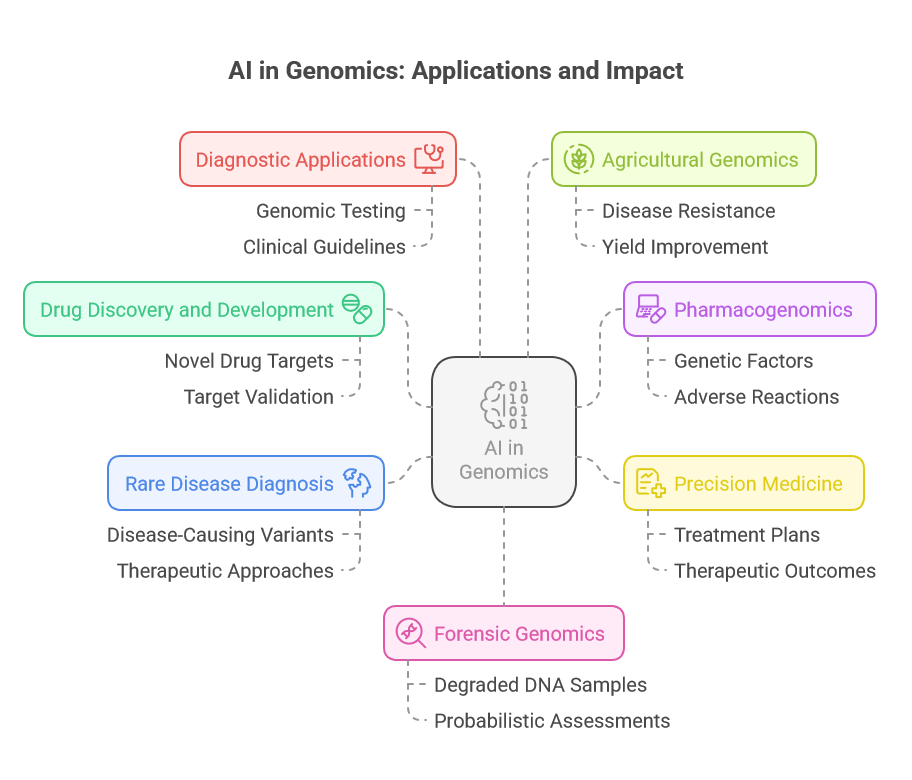
Drug Discovery and Development:
AI is revolutionizing the drug discovery process by enabling the rapid identification of potential drug targets and predicting the efficacy and safety of new compounds. Machine learning models can analyze vast datasets of genetic and clinical information to uncover novel associations between genes and diseases. This accelerates the identification of promising drug candidates and reduces the time and cost associated with bringing new therapies to market. Pharmaceutical companies are increasingly partnering with AI firms to leverage these capabilities, making drug discovery the dominant segment in the AI genomics market.
Precision Medicine:
The promise of precision medicine lies in its ability to tailor treatments to the unique genetic makeup of each patient. AI algorithms can analyze individual genomic profiles to predict disease risk, select the most effective therapies, and monitor treatment response. This personalized approach is transforming the management of complex diseases such as cancer, rare genetic disorders, and cardiovascular conditions. As healthcare systems shift toward value-based care, the demand for AI-driven precision medicine solutions is expected to grow exponentially.
Diagnostics:
AI is also making significant inroads in the field of diagnostics. By analyzing genomic data alongside clinical and imaging information, AI tools can improve the accuracy and speed of disease diagnosis. For example, AI-powered platforms can detect genetic mutations associated with hereditary cancers or identify pathogens in infectious disease outbreaks. The integration of AI into diagnostic workflows is enhancing early detection, enabling timely interventions, and improving patient outcomes.
Other emerging applications include reproductive genomics, agricultural genomics, and population health management, each offering unique opportunities for AI-driven innovation.
AI for Genomics: Regional Analysis of Market Trends
The adoption and growth of AI in genomics vary significantly across regions, shaped by factors such as technological infrastructure, regulatory environment, and investment levels.
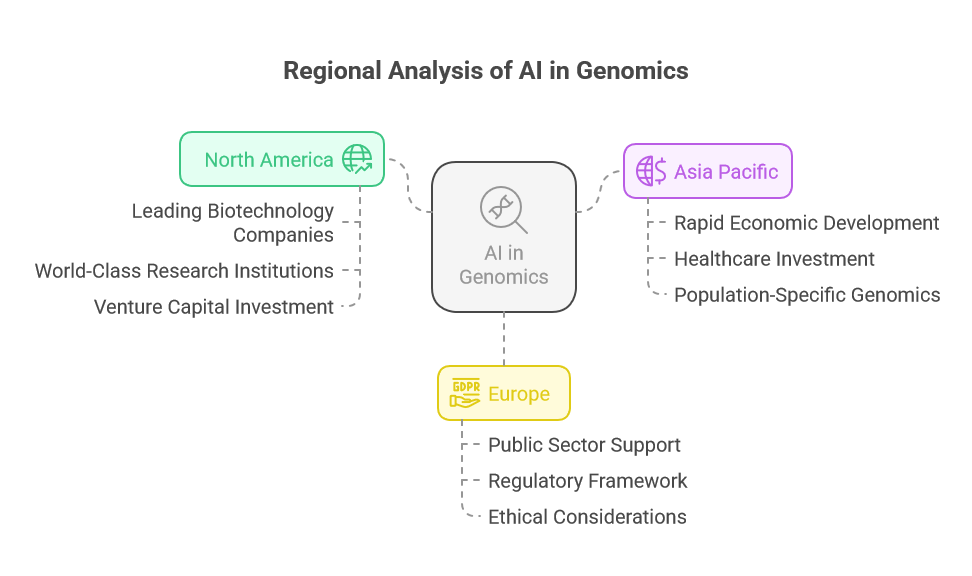
North America:
North America, particularly the United States, currently holds the largest share of the global AI in genomics market. This dominance is attributed to the presence of leading technology companies, advanced healthcare infrastructure, and substantial investments in research and development. Federal initiatives, such as the Precision Medicine Initiative and the All of Us Research Program, have provided significant funding and support for genomics research, further accelerating market growth. The region is also home to a vibrant ecosystem of startups, academic institutions, and healthcare providers collaborating to advance AI-driven genomics.
Asia Pacific:
The Asia Pacific region is emerging as the fastest-growing market for AI in genomics. Countries such as China, Japan, and India are investing heavily in genomics research and AI technologies. Government initiatives aimed at improving healthcare outcomes, coupled with a large and genetically diverse population, are driving demand for AI-powered genomics solutions. The region’s rapid economic growth and increasing adoption of digital health technologies are expected to fuel continued expansion in the coming years.
Europe and Other Regions:
Europe is also a significant player, with strong support from the European Union for genomics and AI research. Collaborative projects and cross-border partnerships are fostering innovation and knowledge sharing. Other regions, including Latin America and the Middle East, are gradually adopting AI in genomics, albeit at a slower pace due to infrastructural and regulatory challenges.
Overall, regional trends highlight the importance of tailored strategies to address local needs and leverage unique opportunities in each market.
AI for Genomics: Competitive Landscape and Key Players
The competitive landscape of the AI in genomics market is characterized by a mix of established technology giants, innovative startups, and leading healthcare organizations. Major companies such as IBM, Microsoft, Google (DeepMind), Illumina, and Thermo Fisher Scientific are at the forefront, leveraging their expertise in AI and genomics to develop cutting-edge solutions.
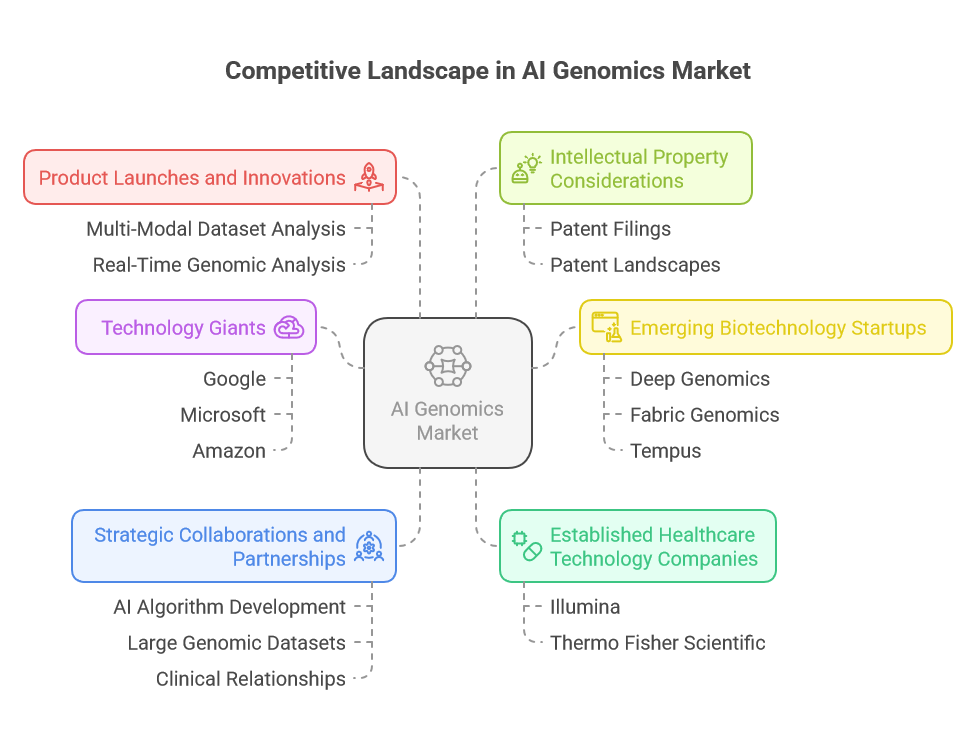
Collaborations and Partnerships:
Strategic collaborations and partnerships are a hallmark of the market, enabling companies to combine their strengths and accelerate innovation. For example, partnerships between pharmaceutical firms and AI startups are driving advances in drug discovery, while collaborations between academic institutions and technology companies are fostering the development of new analytical tools.
Innovations and Product Launches:
Continuous innovation is key to maintaining a competitive edge. Companies are investing in research and development to launch new AI-powered platforms, enhance existing products, and expand their service offerings. Recent product launches have focused on improving the accuracy and speed of genomic analysis, integrating multi-omics data, and providing user-friendly interfaces for clinicians and researchers.
Market Strategies:
To gain market share, companies are also focusing on expanding their global footprint, entering new markets, and offering customized solutions to meet the specific needs of different customer segments. Mergers and acquisitions are common, as firms seek to acquire complementary technologies and expertise.
The dynamic and competitive nature of the market ensures that innovation remains at the forefront, driving continuous improvements in AI-powered genomics solutions.
AI for Genomics: Future Outlook and Market Opportunities
Looking ahead, the future of AI in genomics is exceptionally promising. The market is projected to maintain its rapid growth trajectory, reaching nearly USD 29 billion by 2035. Several factors will shape this evolution.
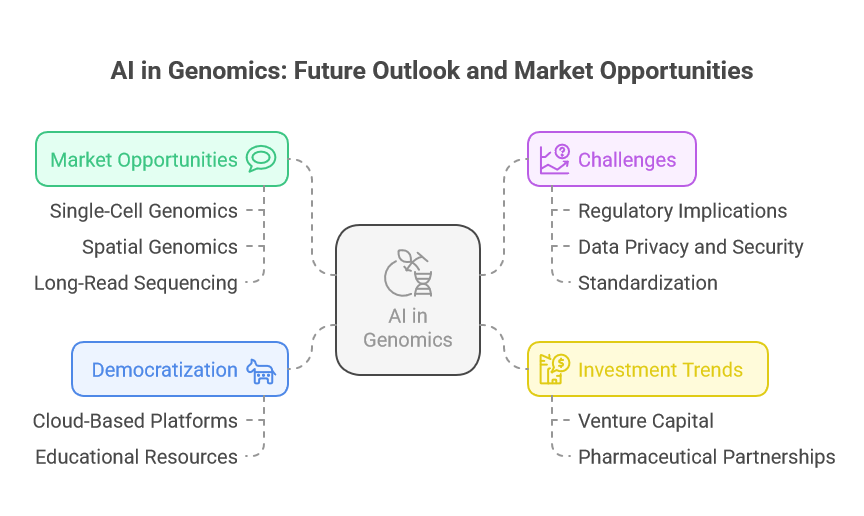
Opportunities:
Advancements in AI algorithms, increased availability of genomic data, and growing demand for personalized medicine will continue to drive market expansion. The integration of AI with other emerging technologies, such as blockchain and IoT, will unlock new applications and enhance data security and interoperability. Investment in AI-driven genomics startups is expected to rise, fueling innovation and bringing new solutions to market.
Challenges:
Despite the positive outlook, several challenges must be addressed. Data privacy and security remain paramount, particularly as genomic data becomes more widely shared and analyzed. Regulatory frameworks will need to evolve to keep pace with technological advancements, ensuring that AI-powered solutions are safe, effective, and ethically deployed. The shortage of skilled professionals with expertise in both AI and genomics could also limit growth, highlighting the need for targeted education and training programs.
Investment Trends:
Venture capital and private equity investments in AI genomics are on the rise, reflecting confidence in the market’s potential. Public funding and government initiatives will also play a crucial role in supporting research and development, particularly in emerging markets.
In summary, the integration of AI into genomics is set to transform healthcare, enabling faster, more accurate analysis of genetic data, improving diagnostics, and paving the way for truly personalized medicine. As the market continues to evolve, stakeholders must navigate challenges and seize opportunities to realize the full potential of this groundbreaking field.
FAQs
- What is the current valuation of the global AI in Genomics Market in 2024?
- What is the projected market value of the AI in Genomics Market by 2025?
- What is the expected Compound Annual Growth Rate (CAGR) for the AI in Genomics Market between 2025 and 2035?
- What factors are driving the growth of the AI in Genomics Market?
![[Market Research Reports] – Research Google News Blog | VMR.Biz](https://www.vmr.biz/wp-content/uploads/2022/12/logo-removebg-preview.png)

